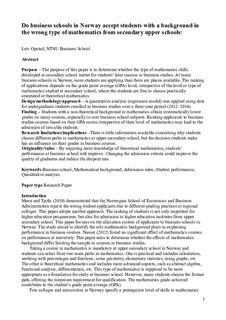'Success in Business studies and mathematical background: The case of Norway'
Journal article, Peer reviewed
Accepted version
Permanent lenke
http://hdl.handle.net/11250/2586536Utgivelsesdato
2018Metadata
Vis full innførselSamlinger
- NTNU Handelshøyskolen [1623]
- Publikasjoner fra CRIStin - NTNU [38127]
Originalversjon
Journal of Applied Research in Higher Education. 2018, 10 (3), 399-408. 10.1108/JARHE-11-2017-0136Sammendrag
Purpose
The purpose of this paper is to determine whether the type of mathematics skills developed at secondary school an effect on students’ later success in business studies. At many business schools in Norway, more students are applying than there are places available. The ranking of applications depends on the grade point average (GPA) level, irrespective of the level or type of mathematics studied at secondary school, where the students are free to choose practically orientated or theoretical mathematics.
Design/methodology/approach
A quantitative analysis (regression model) was applied using data for undergraduate students enrolled in business studies over a three–year period (2012–2014).
Findings
Students with a non-theoretical background in mathematics obtain systematically lower grades on many courses, especially in core business school subjects. Ranking applicants to business studies courses based on their GPA scores irrespective of their level of mathematics may lead to the admission of less able students.
Research limitations/implications
There is little information available concerning why students choose different paths in mathematics at upper secondary school, but the decision students make has an influence on their grades in business courses.
Originality/value
By requiring more knowledge of theoretical mathematics, students’ performance at business school will improve. Changing the admission criteria could improve the quality of graduates and reduce the dropout rate.
